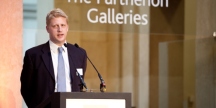Note: this piece was originally published here on the Sociological Review‘s website. It is co-authored by my Manchester Institution of Education colleagues, Steven Courtney & Ruth McGinity.
The Teaching Excellence Framework (TEF) is no easy sell. For a sector already awash with audits, metrics and league tables, the prospect of new measurements – especially ones underpinned by a brazenly market-driven ideology – is difficult to embrace. The ways in which the TEF is discursively framed therefore become crucial to its reception, and the strategies used offer a ready case study into how policymakers co-opt, cajole and (if all else fails) coerce their way to implementation. In an age where headlines matter more than procedural detail, and media messaging more than academic buy-in, the success of higher education policy can hinge on how convincingly it is spun. Wittgenstein’s notions of ‘language games’ are becoming as relevant to higher education research as Bourdieu’s theories of class distinction.
That’s not to impl y that the TEF is without any substantive arguments of its own. When the current Minister for Universities and Science, Jo Johnson, talks about “rebalancing” teaching and learning, few would argue that the scales are in need of no correction. When one of his predecessors, David Willetts, characterised teaching as “by far the weakest aspect of English higher education,” we grimaced, but we couldn’t deny that it has often been over-shadowed by research imperatives. Indeed, as TEF enthusiasts point out, only 37% of undergraduates now report that their degree represents good value-for-money, down from 53% just four years ago.
y that the TEF is without any substantive arguments of its own. When the current Minister for Universities and Science, Jo Johnson, talks about “rebalancing” teaching and learning, few would argue that the scales are in need of no correction. When one of his predecessors, David Willetts, characterised teaching as “by far the weakest aspect of English higher education,” we grimaced, but we couldn’t deny that it has often been over-shadowed by research imperatives. Indeed, as TEF enthusiasts point out, only 37% of undergraduates now report that their degree represents good value-for-money, down from 53% just four years ago.
But such statistics should be treated with caution. First, because they assume commercial paradigms and implicitly deny any notion of university as a public good; in other words, once value-for-money becomes the currency, what counts is not society’s collective advancement but the individual’s net return on their financial investment. And second, because it’s wholly disingenuous to bash university teaching using value-for-money indicators; many students reporting poor value will be doing so because of the extraordinary hike in fees rather than any deterioration in their learning experience.
The reliance on metrics means that, all too frequently, universities are positioned as either reform averse (far too ivory tower’d to understand what their students want) or greedy and self-interested (seeking to preserve a bloated, over-protected sector from the market’s natural justice). The TEF, by contrast, is framed by its supporters as “strengthen[ing] the position of students and prospective students vis-à-vis these powerful institutions” (Emran Mian, 06.11.15). Jo Johnson goes further, claiming that “students are looking critically at what they get for their investment, and so must we, as a government, on behalf of taxpayers” (01.07.15). The government thus become plucky Davids slaying the Goliaths of an outmoded, authoritarian higher education sector. No matter that the National Union of Students passed a motion in favour of “principled disengagement” from the TEF, and has threatened to sabotage next year’s National Student Survey in protest.
 Anti-university discourses are legitimised through mass reiteration: the ingeniously named Office for Students sounds like it will champion and defend learners’ rights; Study UK emerges as a “national representative body for independent providers of higher education”; a methodologically flawed but widely reported survey of staff at independent schools finds they don’t much like the sound of how undergraduates are taught; “too many universities teach pointless degrees that offer nothing to their students,” runs a headline in The Telegraph (Fraser Nelson, 15.04.16). Space rarely opens up to question why one of the economy’s most consistently high-performing sectors (a “world leader, with four universities in the global top ten,” according to the government’s 2016 White Paper) should model itself, both commercially and pedagogically, on a private school system.
Anti-university discourses are legitimised through mass reiteration: the ingeniously named Office for Students sounds like it will champion and defend learners’ rights; Study UK emerges as a “national representative body for independent providers of higher education”; a methodologically flawed but widely reported survey of staff at independent schools finds they don’t much like the sound of how undergraduates are taught; “too many universities teach pointless degrees that offer nothing to their students,” runs a headline in The Telegraph (Fraser Nelson, 15.04.16). Space rarely opens up to question why one of the economy’s most consistently high-performing sectors (a “world leader, with four universities in the global top ten,” according to the government’s 2016 White Paper) should model itself, both commercially and pedagogically, on a private school system.
The co-opting is relentless, and stressed-out university staff eventually turn on the very undergraduates who should rightly be their allies. “My students have paid £9,000 and now they think they own me,” writes an anonymous academic in the Guardian’s Higher Education Network (18.12.15). Undergraduates become pawns in a very public game of chess, discursively courted by government and universities alike, but faced with the same unprecedented levels of debt regardless of allegiance.
 On the day that the government’s White Paper was published, the Minister busied himself on Twitter, disseminating responses to the document from stakeholders such as the Confederation of British Industry (“it’s good that proposals have taken on board the business view”), the University of Buckingham’s Vice Chancellor (“full marks to the minister for not succumbing to pressure from university traditionalists”) and the editor of Conservative Home (“if more would-be students had better information about future earnings they might not go to University at all”). Some might claim that what’s important is the detail of the policy, not the social media clamour surrounding it. However, as quick-to-tweet ministers probably realise, to own the discourse is to the win the argument.
On the day that the government’s White Paper was published, the Minister busied himself on Twitter, disseminating responses to the document from stakeholders such as the Confederation of British Industry (“it’s good that proposals have taken on board the business view”), the University of Buckingham’s Vice Chancellor (“full marks to the minister for not succumbing to pressure from university traditionalists”) and the editor of Conservative Home (“if more would-be students had better information about future earnings they might not go to University at all”). Some might claim that what’s important is the detail of the policy, not the social media clamour surrounding it. However, as quick-to-tweet ministers probably realise, to own the discourse is to the win the argument.
And so the TEF wheedles its way into the sector, despite the perverse incentive of inflationary fee rises and the likelihood of an already-stratified sector being divided further. The prospect of an “outstanding” rating (rather than merely an “excellent” one) will seduce those institutions best equipped to play the game. And despite Green Paper pledges to “address the ‘industries’ that some institutions create around the REF and the people who promote and encourage these behaviours,” similar activities are sure to emerge around the TEF, as numbers are crunched, metrics optimised and self-glorifying statements written.

Meanwhile, so-called “challenger institutions”, summarily checked, enter the market. Public discourses frame them as high-quality food providers, and question why they must seek permission of their corporate competitors to compete (“akin to Byron Burgers having to ask permission of McDonald’s to open up a new restaurant,” Jo Johnson, 09.09.15). Their stakes are small: low start-up costs and minimal regulatory oversight. The bigger gamble is that taken by the UK higher education sector: centuries of hard-won reputational gain wagered on the untested principle that new providers will show a crusty establishment just how HE-level teaching should be done.
If the sector were better able to speak as a united profession, public opinion may be more inclined to lean in its direction. The best way to rebalance research and teaching is probably to obsess less about measuring the former rather than to obsess more about measuring the latter. But greater coordination and discursive agility is required to persuade those outside academia how damaging an unchecked marketisation agenda might ultimately prove. Students need winning over with evidence, not assurances, that their learning is our top priority; the role of research in pedagogy needs defending more stoutly; and the value of higher education to wider society needs articulating more forcefully and more often. Perhaps the sector could learn a thing or two from the TEF’s advocates about how to frame public discourses.
